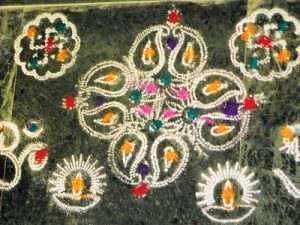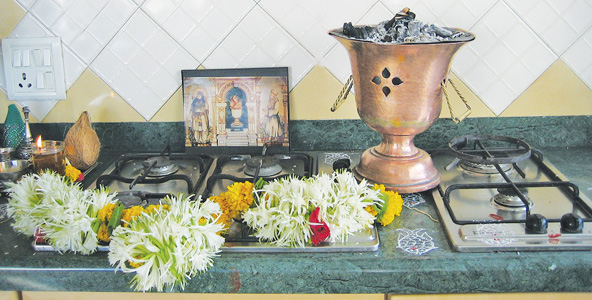 No matter what you’ve accomplished in life so far, no matter if you are male or female, rich or poor, educated or a moron, chances are, you have a bit of ‘Parsipanu’ in you. It comes as a package-deal with our genes and chromosomes. Other communities call it Parsi-eccentricities but that doesn’t cramp, suffocate or diminish our MAD-BAWA-STYLE!
No matter what you’ve accomplished in life so far, no matter if you are male or female, rich or poor, educated or a moron, chances are, you have a bit of ‘Parsipanu’ in you. It comes as a package-deal with our genes and chromosomes. Other communities call it Parsi-eccentricities but that doesn’t cramp, suffocate or diminish our MAD-BAWA-STYLE!
In my childhood (40’s and 50’s) you could ‘smell’ the pleasant ‘Parsipanu’ the moment you opened your eyes, by the whiff of the ‘loban’. It would be taken all over the house, to every nook and corner and to every family member who would bow down to Ahura Mazda in gratitude for the brand new day. Today, very few lucky Parsi homes have this practice going. In fact today, most Parsi housewives don’t even have the time (or the inclination) to do chok-na-sagan or toran! They have these permanent Rangolis fixed near the entrance to their houses and a permanent floral-toran made of paper or nylon! The early morning sagan is left to the ‘Gangubai’ who invariably turns up late, sometimes even at 10 o’clock and does everything routinely.
After this came the cooking. The lady or ladies of the house would cook sumptuous meals for the family. Masalas would be ground on the black masala-no-patthar (stone) hammered into tip-top condition by the ‘Taakivali’ from time to time. The food was thus finger-licking good compared to today’s fare, with the masalas being bought ready-made.
Mealtimes, especially dinners, were a family affair and all members had to be home by 8:00 pm around the dinner table. Today, in most nuclear families, the husband works and the wife works, so how does the house work? Simple. The hubby (or wife) tells the spouse, “I’m working late tonight – take out the frozen ‘whatever’, microwave it and eat it. Don’t wait up for me!”
One ‘Parsipanu’ I really miss are the muktads done at my house. The entire house pulsated with Bapaiji’s energy as she selected everything, from flowers to fruits (at age 80) for the man she loved and lost and whose photo she kissed daily. She did not assign any priest to pray for her departed husband, saying,“they pray for money, I pray for love.”
Even the papri, daran and malido were prepared in advance at home and put in the ‘chasni’ tray. As a child, this was my first experience of the seamless relationship between everyday life and the world beyond, where our ancestors go. The prayer-corner in the kitchen became my childhood place, associated with customs, rituals, worship and spirituality we called ‘Parsipanu’ which existed abundantly then.
As I said, Bapaiji was iconoclastic and also, didn’t believe in paid-rituals. Also, she always prayed at home saying, “My prayers are not less holy because I say them in my house.” She believed in the maxim, ‘the hands that help are holier than the lips that pray.’
I got my religious grounding from the ‘Dharmagyan ‘ classes at the Cusrow Wadia Gujarati Medium School (in Cusrow Baug) from Dasturji Jal Bajan in my childhood. Another bit of ‘Parsipanu’ that has vanished is the young man (working in the Karani Agiary at Cusrow Baug) who would come door-to-door with a small wooden-box to collect donations for the ‘Behram Roj’ Jasan once a month. He would just yell ‘Behram Roj’ as we opened the door and people would understand. Once my elder daughter, Delna, who must have been four at that time bumped into him on the staircase and immediately greeted him with “Hi Behram Roj” thinking that’s his name!
Jokes about the ‘Parsi nose’ are also part of our ‘Parsipanu’. Because we are an enlightened community, we know how to laugh at ourselves. Some have a perfectly aquiline nose like a Greek God while some have a parrot-like nose. Some have had surgery done on it to prevent snoring but the Parsi nose is unique since the Parsi loves to poke his nose in other people’s business and Parsis have a nose for inviting trouble (read senseless controversies).
In fact, we don’t face any external threats for extinction. The danger lies within due to late marriages, delaying the first child, inter-caste marriages and so on. Our boys and girls immigrate to Western countries and marry the locals there. This also eradicates our ‘Parsipanu’. Someday, some granny may read a fairy-tale to her grandchild, “Once upon a time, there were some wonderful people called Parsis” and the grandchild’s eyes will widen with wonder.
‘Parsipanu’ and the Parsi’s car go hand in hand. Even if a Parsi man is not romantic and not likely to get married, he will have a torrid romance with his car or his bike. If he is married, well, the car is his ‘mistress’ and the wife will have to understand! The car is the Parsi man’s toy which he never outgrows. He’ll bring her home like a bride with proper chok-narial-toran-na-saganand he’ll sink into a massive depression if God forbid, he ever finds a scratch on it. He may not treat his wife in a loving way, but he will surely fuss over the (Sauten) car, at times even washing it himself or else driving the cleaner mad, saying “Baraber dho ni!!”, until the poor chap retorts, “Abhi kitna barabar dhoyega??”
My own case is even more unfortunate. On our morning walks, if my hubby sees some tiny spec on our car, he takes out his kerchief and cleans it. But if a crow does ‘good-luck’ on me, he will clean it with some dry leaf and say, “Its’ gone.” An average Parsi has seen them all, in terms of cars right from grandpa’s Austin and Morris Minor to Di Soto to Fiat, to Maruti to Mercedes to the one with four bangles (char chital vali Audi). He may use it only once a week or worse still, once a month, but the car will be in tip-top condition! You can’t really blame him, it’s his ‘Parsipanu’! That’s why other communities want to buy a ‘Parsi-owned car’.
I miss the ‘Parsipanu’ of the Parsi family doctors who would do home visits and comfort patients. Their ‘Davakhanas’ were very simple with embossed glass, opaque curtains unlike the state-of-the-art clinics today. The doc required to examine your pulse, check your tongue (say Aaaaaaah) and then put his stethoscope on your chest and back. He would then write a prescription for his compounder who would give you a mixture that tasted like rotten wine but cured you in two dozes!
In the good old days, ‘Parsipanu’ extended to the friendly busybody lady called ‘Kaaj-Wali’ who would find a spouse for your son or daughter. I am no ‘Kaaj-Wali’ but once I got sucked-into a bad situation. An old orthodox aunty requested me to find a ‘boy’ for her gulab jevi dikri living in Surat. The ‘boy’ should not be more than forty. Luckily, when she came from Surat, I screened the gulab before recommending her to anybody. And guess what!!! The gulab was at least 45 years old and wearing socks till her knees with two chotlis doing ding-dong on her satin-no-dress. Realising that this gulab toh karmai gayeloo che (withered), I made a quick exit after giving some excuse.
In the good old days, on Pateti, Navroze and Khordad Sal, a Nan-Khatai Band would come early morning in Parsi Colonies and Baugs to play popular Hindi and English songs and the Colony children would run after them. Of course their music was off-key, loud and jarring but an Irani uncle living in the next block would be delighted and say “khotavagar pun mottavagar”!
Some things never change, and the more they change, they remain constant because change is the only constant in life. On Navroze/ Pateti, the postmen, gardeners, electricians, kachrawalas and people you had never seen in your life, knock on your doors for tips – “Popeti dya!”
The obligatory Parsi Natak is another constant in our ‘Parsipanu’. If not Natak, then a movie or a dinner, but celebrate we must because ours is a religion of happiness, of joy and celebrating life itself.
The accumulation of years can take a tragic toll at times. Beaten down by moving-times and loss of values, Parsis have turned away from life’s higher promise and retreated into debilitating clutches of comfort and compromise.
Instead of taking on challenges, we are avoiding them, fighting over silly things that don’t matter at all in the larger scheme of things. Today, we are basking in past glory. However, all is not lost. We still have brilliant minds and honest people.
They should guide our youth to ‘grow in Parsipanu’ with optimism, humour and love, each succeeding decade. Then and only then will the community thrive with energy, resilience, joy, love, spontaneity and optimism.
- Meherbai’s Mandli Plans For Jamshedi Navroz! - 15 March2025
- Meherbai’s Mandli’s New Year Resolutions Become Foos-Faas!! - 15 February2025
- How Long Can You Stare At Your Wife? - 25 January2025
